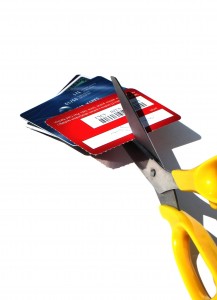The use of credit cards may make it faster and simpler to make purchases, but for many it comes with a price. With multiple credit cards, it may become increasingly difficult for you to monitor your spending, and you can easily fall into debt. Credit card debt can be extremely difficult to get out of, so if you find yourself in debt use these tips to help you manage your debt before it gets out of control.
1. Check Your Credit Report

There are three major credit reporting agencies that you can get a free credit report from once every 12 months. By frequently checking your credit report, you will not be surprised by how much you owe, helping you to stay on top of your debt. Once you receive your report, take the time to look over it and check it for inaccuracies. Having incorrect information on your credit report is easily fixed with a letter to the agency and can save you a ton of money. The more negative things reflected on your credit report, the more difficult you will find it to make large purchases such as a home or vehicle and the higher your interest rates will be.
2. Make a Budget
Having a budget that includes all of your monthly spending will help you to find the most money available to pay off your debt. Take some time to sit down and evaluate your monthly bills and essentials. If there is anything that you can live without for a while, consider eliminating that cost. With the money you save, you can use it to help pay off your debt sooner.
3. Don’t Quit Making Payments
Once you have successfully paid off one of your cards, don’t quit making payments. Instead, put money you would have been using towards the payment on another card. It is going to be tempting for you to just take that money and spend it on something for yourself. Nevertheless, if you are serious about getting out of debt, you should continue to put the money towards better use–at least until all of your credit card debt is gone.
4. Transfer Debt
Interest can cost you a lot of money. If you have the opportunity to transfer your debt from one card to another with a lower interest rate, that is an opportunity you need to take. Cards with higher interest rates will end up costing you more money to pay off, meaning it will take you a lot longer to resolve your debt.
5. Avoid More Debt
Once you are in debt, it is important that you don’t keep adding to it. Continuing to use your credit cards it will only make matters worse, so avoid the temptation. One simple thing you can do to help you avoid that temptation is to leave your cards at home. By leaving your cards at home, you won’t be able to use it even if you wanted to. This being said, you may want to keep the card with the lowest balance on you to be used strictly in emergencies.
6. Credit Counseling
Credit counseling can help you to get on the path to paying off your debts, and in some cases, settle your debt for less than you owe. If you are really in trouble, perhaps thinking of bankruptcy, credit counseling could be of great help to you. The downside to credit counseling is that if you do choose to settle for paying a lesser amount, your credit score will drop.
7. Make the Call
If you see yourself headed for trouble, don’t hesitate to call your creditors. If you take the initiative and contact your credit card company, they may be willing to work with you on your payments. So, pick up that phone before they decide to–the outcome may surprise you.
8. Know Your Card
The more you know about your card, the more you may be able to save. Knowing about any hidden fees can prevent you from falling further into debt. For example, if you are having difficulties paying your balance on time, you may be getting charged a late payment fee. Also, get to know about any rewards or services your card may have to offer. If you’re lucky, you may be able to use some of your rewards toward your balance. It is also possible that your card offers services such as roadside assistance. If you have to use this, put the money you would have had to spend on the assistance towards your debt.
9. Prioritize
In order to pay off your debt as quickly as possible, you should prioritize your payments. Look at each of your credit cards and determine the order in which you should pay them back to get the job done as quickly as possible. The things you should look at are the interest rate, percentage of credit limit used, how close they are to being paid off, and the annual fees. The card that has the highest interest rate, amount of credit used, and annual fee should be your top priority.
10. Pay on All Your Cards
If you’ve got more than one credit card, it is important that you continue to pay at least the minimum on all of them. Although you are focused on paying off your top priority card first, neglecting to make payments on your other cards can put you further into debt. Make your largest payment to your top priority card, and if you have the ability to pay more than the minimum on any of your cards, go for it. It will get you out of debt much faster.
